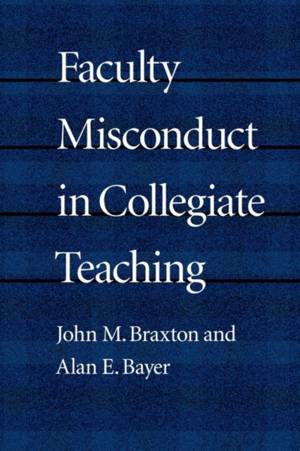
- Afhalen na 1 uur in een winkel met voorraad
- Gratis thuislevering in België vanaf € 30
- Ruim aanbod met 7 miljoen producten
- Afhalen na 1 uur in een winkel met voorraad
- Gratis thuislevering in België vanaf € 30
- Ruim aanbod met 7 miljoen producten
Omschrijving
In Faculty Misconduct in Collegiate Teaching, higher education researchers John Braxton and Alan Bayer address issues of impropriety and misconduct in the teaching role at the postsecondary level. Braxton and Bayer define and examine norms of teaching behavior: what they are, how they come to exist, and how transgressions are detected and addressed. Do faculty members across various collegiate settings, for example, share views about appropriate and inappropriate teaching behaviors, as they share expectations regarding actions related to research? And what mechanisms are utilized to correct inappropriate behavior on the part of college and university teachers?
The authors' work is based on survey results obtained from faculty members at research universities, liberal arts colleges, and two-year community, junior, and technical colleges. Braxton and Bayer's focus is on undergraduate teaching in four disciplines: biology, history, mathematics, and psychology. In their analyses, the authors examine how individual, disciplinary, and institutional differences influence professorial behavior.
In contrast to the more explicitly understood and enforced rules of conduct in research, the authors find that teaching norms are informally defined and observed. They argue that a formal code of ethics for undergraduate teaching would serve the dual purpose of improving undergraduate education and elevating the status of college teaching.
A groundbreaking study of contemporary academe, Faculty Misconduct in Collegiate Teaching is required reading for all university and college instructors and administrators
Specificaties
Betrokkenen
- Auteur(s):
- Uitgeverij:
Inhoud
- Aantal bladzijden:
- 240
- Taal:
- Engels
Eigenschappen
- Productcode (EAN):
- 9780801870965
- Verschijningsdatum:
- 31/01/2003
- Uitvoering:
- Paperback
- Formaat:
- Trade paperback (VS)
- Afmetingen:
- 152 mm x 229 mm
- Gewicht:
- 362 g

Alleen bij Standaard Boekhandel
Beoordelingen
We publiceren alleen reviews die voldoen aan de voorwaarden voor reviews. Bekijk onze voorwaarden voor reviews.











